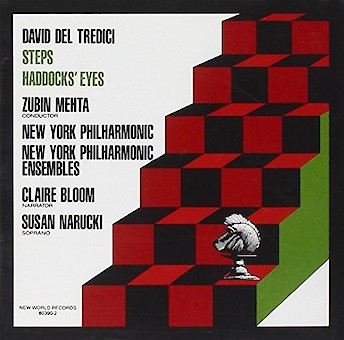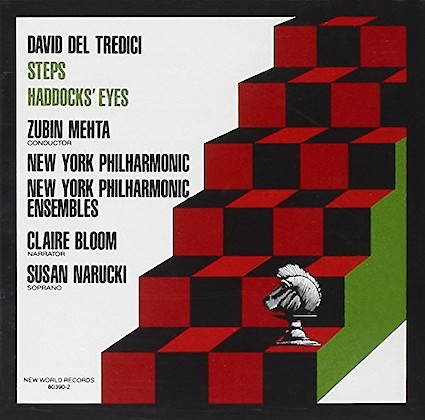Massive and grandiose, violent and raucous, Steps moves like an enormous procession across half an hour's time. The single arching movement divides into four sections. Giant Steps begins a somber forward march. The Two-Step is boisterous—a contrasting, clattering dance. Giant Giant Steps, a climactic recapitulation, is full of furious activity, while Stepping Down, the coda-finale, brings some measure of serenity. The ending itself is equivocal.
Steps is music written for the Easter Island statues, should they decide to walk, said a friend after hearing my own piano rendition of it. I like the image, suggesting as it does inexorable movement and the larger-than-life. It is no accident, after all, that the adjective giant appears three times in the subsection titles. The image of a huge machine moving relentlessly forward haunted me through the composition of three successive orchestral pieces, March To Tonality, Tattoo and now Steps. Each piece manipulates obsessive rhythmic repetition, metallic orchestral textures and high-decibel sonorities to create the illusion of unstoppable alien energy, at once terrifying and fascinating. Steps stands tallest; it is, if you will, the Kong of the three.
Then, too, Steps is my most dissonant tonal piece, as remote from Final Alice as Easter Island from Oxford University. In the Alice pieces, I bent tonality to the service of nostalgia, attempting to evoke those "happy summer days gone by" of which Lewis Carroll wrote so lovingly. Carroll's recollected joy—boating expeditions up the Thames with the three Liddell sisters—became, for me, compositional foragings in the lush, harmonic outgrowth of Mahler-Strauss.
In Steps, I tried to create a harder-edged tonality: one with fewer referential glances, less consonant glow. In the process, dissonance began to assume an almost programmatic role. Dissonance as destroyer, dissonance as chromatic infector, dissonance as tonality-devouring Mothra - these became enlivening images as I explored a twilight tonality that was taking me far from the steps of Carroll's Christ Church College (or so it seems to me now, ex post facto, as I struggle to make verbal sense of what was, after all, an entirely intuitive, aural process).
Steps has three principal themes and begins with a signature-sound: heavily muted brass playing a dominant-seventh chord ravaged by dissonant alterations. This harsh rasp is a musical signpost that recurs again and again. The first theme is a mournful dirge played only by muted strings. It is joined, at the first fortissimo, by a crawling, chromatic spider-theme heard in the bass (so called because the theme is drawn from a work-in-progress, my setting of the familiar poem The Spider and the Fly).
Thereafter, and particularly in Giant Giant Steps, the two themes are locked together, juxtaposed. Like Godzilla battling Megalon, each struggles to dominate the other, creating havoc and excitement along the way, but little resolution.
A third theme stands apart. It is not introduced until the work's trio section, The Two-Step, and return only in the coda, Stepping Down. Vigorous and diatonic, sober and straightforward, this theme brings a measure of stability, providing firm footing on an otherwise slippery and twisting tonal path.
Mr. Del Tredici then goes on to produce what one member of the orchestra called the perfect New York Philharmonic piece—loud, fast and high.
But Mr. Del Tredici knew his audience as well as his orchestra, He grabbed his listeners' attention with that opening rasp and held them just as much in his thrall for the duration.
Oh that David Del Tredici! He writes this extravagant, long program note about "Steps" for Orchestra, the half-hour piece given its world premiere by the New York Philharmonic Thursday night, that's enough to scare any listener in advance: It's all about "dissonance as tonality-devouring Mothra," "high-decibel sonorities," "Godzilla battling Megalon."
But program notes are not programs. "Steps" turned out to be a bubbling, inventive, humorous, high-spirited romp, studded with ingenious parodies of American movie and television music as well as references to some European classics, a zesty stew.
David Del Tredici is one of today's most skilled orchestral composers. A musical alchemist, he reaches into the grab bag of tried-and-true symphonic effects and somehow manages to concoct something new and fresh-sounding.
Both of the works on this disc are recent compositions that will stir and amuse you. Steps, written in 1990, contains four interrelated episodes assembled into a continuous movement. Conductor Zubin Mehta's musical personality is well-suited to its sweeping gestures and he draws a grandiose and richly-colored sound from the New York Philharmonic. The music itself, which lives up to the composer's intention to write a "musical pot-boiler," is always attractive. Even when things turn ugly or monstrous (and they often do!) the sounds do not grate, but rather draw you in.
'Steps' is an extraordinarily rambunctious piece, bold and outrageous in its way, not for saying anything new but because it dares to take material that is already ultimate in its style another step beyond.
Audio (4)
Recordings (1)


Haddocks' Eyes, Steps
1992, New World Records (80390-2)Works
Performers
- Zubin Mehta, Conductor
- New York Philharmonic
- Susan Narucki, Soprano
- Claire Bloom, Narrator